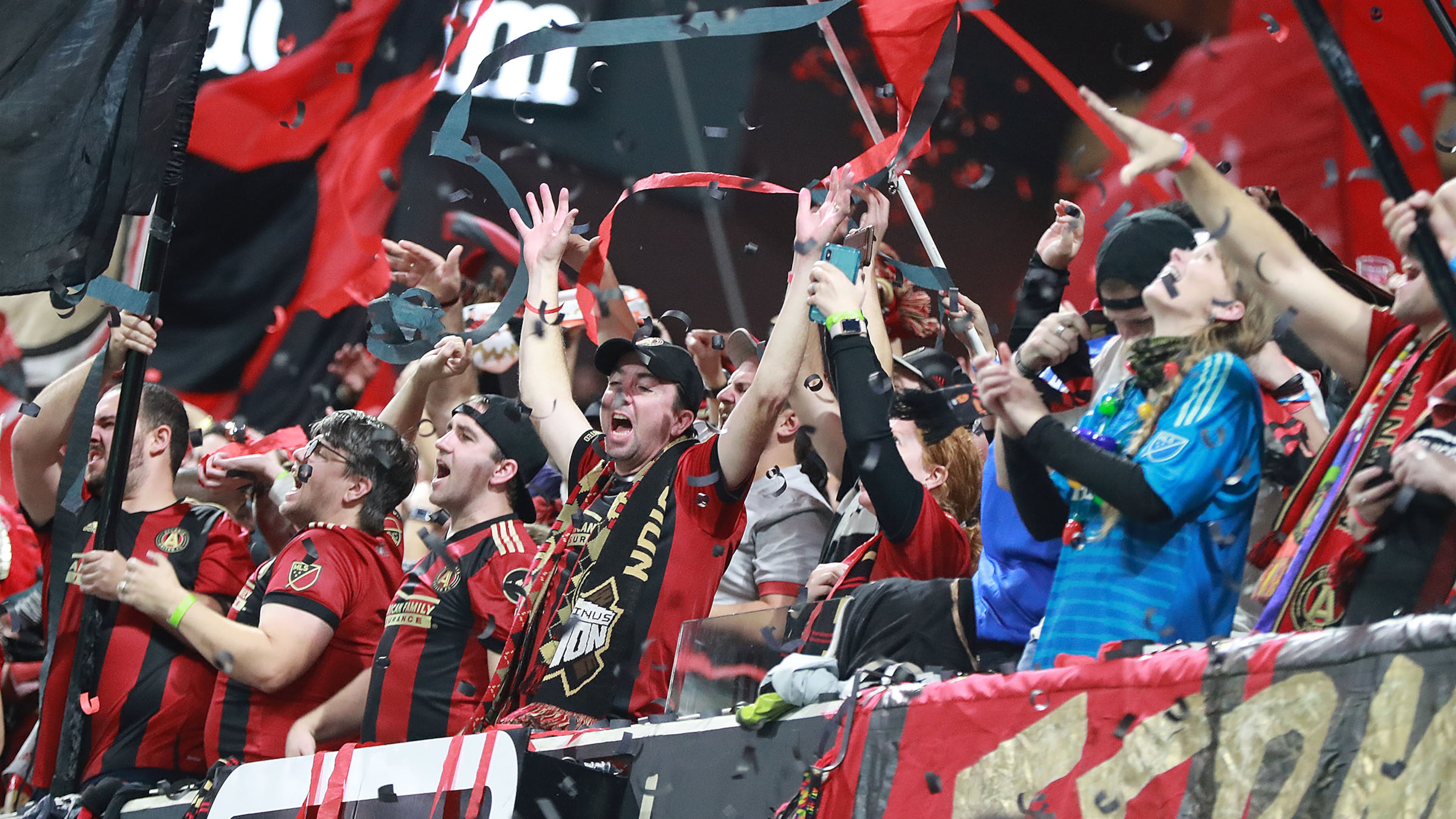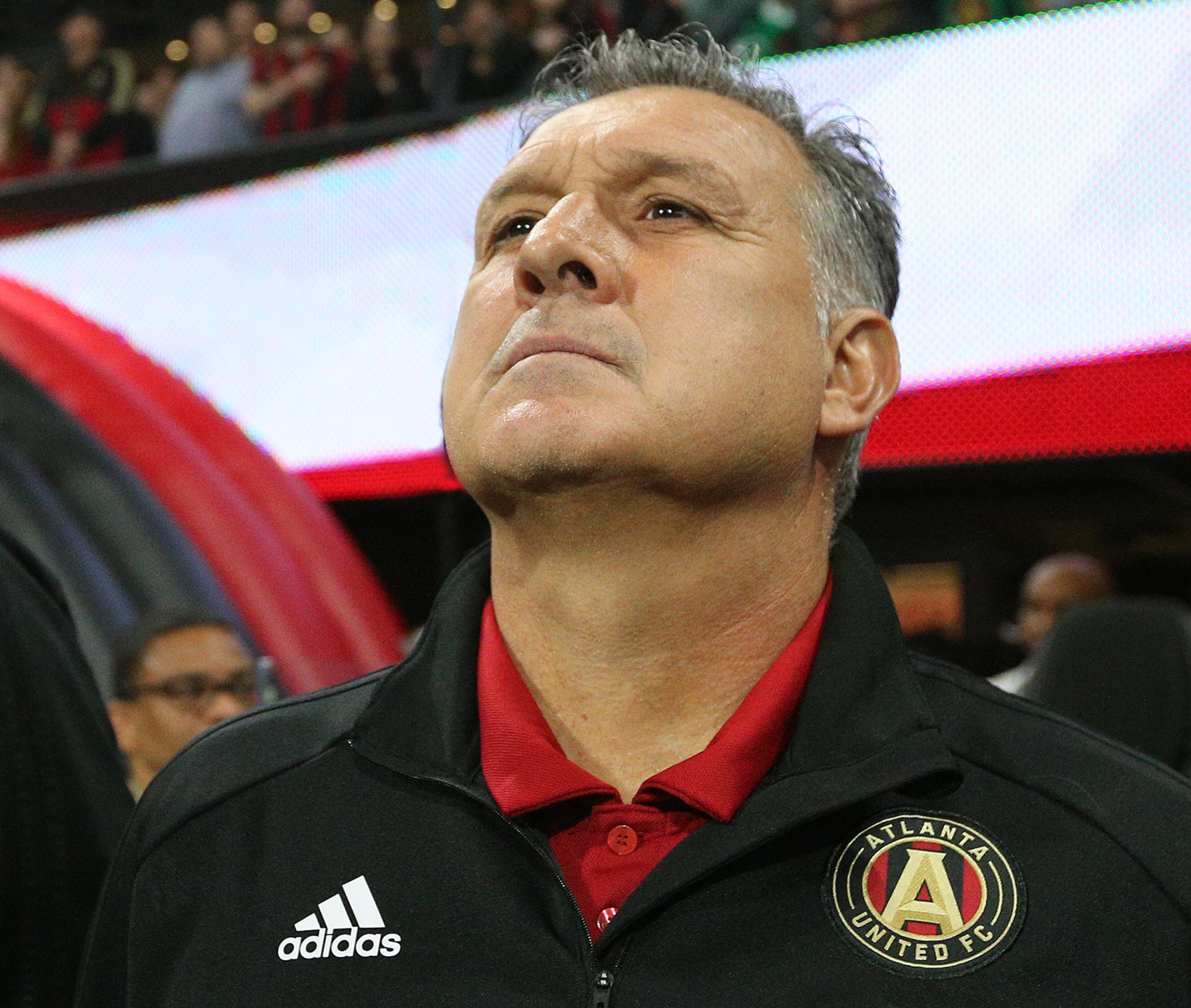
When Juan Mena moved to Atlanta 13 years ago, he was almost on an island by himself.
He grew up in Queens N.Y. as a diehard New York Giants fan and was a bat boy for the New York Yankees during their championship run of the late 1990s.
But he was born in Medellín, Colombia, where his father was a star of a local soccer club.
“Atlanta is SEC country, where it is all about college football, then the Falcons, then the Braves,” Mena said. “But soccer is in my blood.”
Then in 2017, Mena got his own soccer team. Or, more accurately, soccer got him and Atlanta.
Now, less than two years after Atlanta United FC’s first match, the city’s hometown team on Saturday reached the pinnacle of North American soccer, squaring off at Mercedes-Benz Stadium against the Portland Timbers for the Major League Soccer Cup — and winning the championship in a 2-0 game.
More than 70,000 fans, many of them decked in Atlanta United’s red, black and gold colors and chanting “A-T-L,” packed Mercedes-Benz for record attendance at an MLS Cup showdown.
RELATED: An Atlanta United fan participation guide
United draws more people per game than any American professional sports team not in the National Football League, attracting crowds large enough to rival top clubs in Europe, where soccer long has been a religion.
The meteoric rise has the feel of an overnight sensation. But in some ways it’s not, with roots dating to 1968, when the Atlanta Chiefs won a national soccer league championship. It’s also the natural outcome of the shifting face of the city – more diverse, more international – decades in the making.

Even United has been around longer than its inaugural game, a 2-1 loss against the New York Red Bulls on March 5, 2017, at Georgia Tech’s Bobby Dodd Stadium. Atlantans started collecting petitions for a team years earlier and United owner Arthur Blank weighed an MLS franchise for more than a decade.
It doesn’t hurt that United keeps winning in a city that has had its share of losing and heartbreak. The team’s cumulative record: 36 wins, 16 losses and 16 draws. This week, United forward Josef Martinez notched the league’s Most Valuable Player award after netting more goals in a season than any other player in MLS history.
MORE: 'Rowdy, proud' Atlanta United fans as entertaining as the game itself
Football versus futbol
Football, the American version, has long dominated Atlanta and Georgia’s landscape.
Last week at Mercedes-Benz, the University of Alabama beat the University of Georgia for the SEC championship in a thrilling re-match of last year’s national championship game. Next Saturday, North Carolina A&T State University and Alcorn State University will battle in the Air Force Reserve Celebration Bowl for the black college national championship. Then there are the Atlanta Falcons, with one of the most rabid fanbases in the NFL.
But there was always room for more. The Atlanta Hawks have never traditionally drawn well, two NHL teams have abandoned the city and the Atlanta Braves, the oldest professional sports team in the region, abandoned the city in 2017 for comfier, newer digs in Cobb County.
Enter Atlanta United, which has tapped into the swelling ranks of out-of-state and out-of-country transplants. About 27 percent of metro Atlanta residents were born in a different state, according to a recent report from the nonpartisan immigration think tank New American Economy.
Many American transplants bring their professional sports teams with them, but soccer is often a blank slate. Spotted on an Atlanta street this week: a pick-up truck with stickers for the Boston Bruins, Boston Red Sox and Boston Celtics - and United’s “A” logo alongside a customized United license plate.
“People already have their college and professional teams,” said Mena, the Atlantan by way of South America and New York, who traveled to Russia this year for the FIFA World Cup to watch Colombia beat Panama. “No one had a soccer team. Atlanta United was the perfect storm.”
Many of the transplants came from countries where soccer is already the No. 1 sport. Some 13.8 percent, or nearly 800,000 of metro Atlanta’s population, was born in a foreign country, up from 10 percent in 2000, with close to $20 billion in spending power. More than half of them are from the soccer hotbed of Latin America, according to New American Economy.

Atlanta has flirted with professional soccer for years, most recently with the minor-league Atlanta Silverbacks, which was founded in 1998 and still plays in Atlanta Silverbacks Park near Spaghetti Junction in northeast Atlanta.
But the last top-level team to play in Atlanta was the now-defunct Atlanta Chiefs of the National Professional Soccer League and North American Soccer League, which played from 1967 until 1972, winning the championship exactly half a century ago.
“Atlanta back then was really a town, and nobody knew what soccer was here,” said Bob Hope, who ran public relations for the Chiefs, as well as the Atlanta Braves and the Atlanta Hawks from the 1960s through the 1980s. “But when the Chiefs came in ’67 and won the championship in ’68, there was a great spirit behind it. The Chiefs did a wonderful job in planting the seeds for youth soccer.”
A lot of the fans who show up at Mercedes-Benz to watch soccer come with their kids, who also play. And tickets are cheaper than for a Falcons game, making it easier to bring the whole family.
Friday night football games were big back when Katherine Carlisle was a student at Marietta High School. Now, as a mom of two young soccer players, she’s thrilled her kids have major-league games to watch here.
“I’ve always been a soccer fan but I’ve become an even bigger one since Atlanta United came to town,” she said. Her daughter Ava, 7, and son Ethan, 4, both play soccer at their church youth league. Ethan also plays on his preschool squad.
Diverse fans unite
With more that 37,000 season ticket holders and average crowds exceeding 52,000 – including the league record of 72,243 — for home games, United is among the 15 top soccer clubs globally in attendance.
Last month, Forbes Magazine reported that at $330 million, United was the most valuable team in the MLS. United also accounts for one-quarter of league-wide merchandise sales and five of its players number among the 25 top-selling jerseys.
Catie Griggs, United’s vice president of business operations, said most of the ticket holders come from inside the perimeter, but thousands also come from farther, sometimes driving hours to watch the team.
“When you look at our demographics, our fans are urban, young, millennial and diverse,” she said.
Locals clamored for a major-league soccer team for years, launching an “ATL Wants MLS” campaign in 2011 and collecting more than 3,000 signatures. In 2014, when Atlanta was selected for an expansion team under Blank’s ownership, campaign leaders formed Terminus Legion, the first supporter club, celebrating at a Westside brewpub.
Blank and his team got to work right away. Darren Eales was hired as president in September 2014, moving from Tottenham Hotspur Football Club, a renowned English Premier League team. In September 2016, United announced its coach would be Gerardo “Tata” Martino, an Argentine who headed national teams in his home country and in Paraguay.

Martino’s reputation helped United land young talent from Latin America, including MVP Martinez, a Venezuelan, and Miguel Almiron, an attacking midfielder from Paraguay’s national team. Another young star player, Ezequiel Barco, hails from Argentina, one of five Argentines on United’s roster.
Blank spent heavily on marketing long before United’s first game. The team blanketed neighborhoods with United signs and flags, showing up at 5K races and other community events, and sending players and coaches to soccer watch parties.
“They did everything right. They got on it a couple of years earlier. They built a big stadium. They hired the right people. They hired the right coach. They signed a bunch of great young players. That’s a blueprint for success,” MLS Commissioner Don Garber told the Atlanta Journal-Constitution earlier this year.
Hope, president of Hope-Beckham, an Atlanta-based public relations firm, remembers when the team held a massive party for more than 4,000 fans and celebrities, including Ludacris, to announce the name of the team and its logo in July 2015. Hope said the event was bigger than anything the Braves, Falcons or Hawks had ever done, adding that from day one, United had an attitude that they “were a big deal.”
Team officials say the club doesn’t officially market to particular ethnic groups. Still, Gigi Pedraza, director of the Latino Community Fund, said the team has built relationships with Hispanic organizations and has been a constant presence at Latino events, embracing Spanish.
“You see great diversity in the team and the leadership that reflects the diversity,” said Pedraza, who is from Peru. “People see themselves represented in the team and in the employees making the decisions.”
But there are also African-American and suburban moms and dads carrying babies wearing headphones.
Rapper Waka Flocka, with 1.9 million Twitter followers, regularly tweets about United. Big Boi, of the hip hop duo Outkast, brought a hammer down on the team’s golden railroad spike during a recent match, part of an elaborate ritual at home games. Another Atlanta native, country music star Zac Brown, performed the honors at an earlier game.
The golden spike is a nod to Atlanta’s beginnings as a railway terminus, when the town was called Terminus, not Atlanta. It’s also part of the young team’s effort to forge a local mythology that predates the SEC, NFL, MLB and NBA.
“The atmosphere is electrifying,” said Carlisle, the local fan. “The fans are great, the people working the venue are great. It’s a great place for people of all backgrounds to come tougher and get behind a team we can all root for.”
-Jennifer Brett contributed to this report.
RELATED: Parking, restaurants, info for fans about watching the MLS Cup
Atlanta United by the numbers:
5: The number of Atlanta United team members whose jerseys rank in the top 25 in MLS sales, tops in the league.
$20-$225: The range of ticket prices for a United match, compared to $55-$385, plus personal seat license fees for the Atlanta Falcons.
25: The percentage of team merchandise sold online in relationship to the rest of the league.
36: The number of wins the team has had in its first two seasons as a member of Major League Soccer (MLS).
1968: The last time a professional soccer team won a league championship, the beloved and defunct Atlanta Chiefs.
37,000: Number of season ticket holders.
52,000: Average crowd size for home games, ranking Atlanta United as one of the top clubs in the world for soccer attendance.
72,243: The number of people who came to see the Atlanta United host Seattle on July 15, 2018, a record.
$330 million: The value of the team, according to Forbes Magazine.


